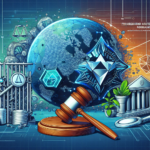The Rise of Tokenization in Risk-Weighted Assets (RWA)
Understanding RWA Tokenization
Risk-weighted assets (RWA) have traditionally been a significant area of focus in financial compliance. Tokenization refers to the process of converting the rights to an asset into a digital token on a blockchain. This innovative approach is gaining traction, especially within the realm of RWAs, as it offers a new way to enhance liquidity, transparency, and efficiency in asset management.
The Current Landscape of Compliance
Compliance frameworks have historically been built around traditional asset classes and regulatory guidelines laid out by governing bodies. Regulations such as the Basel III Framework emphasize the importance of managing risks associated with RWAs, leading banks and financial institutions to adopt stringent compliance measures. The challenge lies in integrating these regulations within a rapidly evolving digital ecosystem.
The Traditional Compliance Framework
In traditional settings, compliance primarily involves extensive reporting, auditing, and monitoring practices to ensure adherence to regulatory standards. Regulators require a comprehensive understanding of the risks involved in holding different asset types, which can be cumbersome and often lacks the agility required in today’s fast-paced market.
The Change Tokenization Brings
Tokenization introduces a new layer of complexity. Once assets are tokenized, they are represented digitally, enabling real-time transactions across borders. This shift necessitates a modification of existing compliance structures to accommodate the new characteristics of these digital assets. Compliance must evolve to account for the speed and decentralization inherent in tokenized RWAs.
Implications of Blockchain Technology on Compliance
Enhanced Transparency and Traceability
One of the most significant benefits blockchain technology provides is transparency. Each transaction is recorded on a public ledger that is immutable and traceable. For compliance officers, this transparency offers substantial advantages. They can access, verify, and audit asset ownership and transaction history with unprecedented ease, reducing compliance burdens and audit costs.
Automated Compliance through Smart Contracts
Smart contracts are self-executing contracts with the terms of the agreement directly written into code. They greatly enhance compliance by automating many processes that previously required human intervention. For example, smart contracts can automatically check compliance requirements against transactions, ensuring that only compliant transactions are executed. This reduces the risk of human error and enhances operational efficiency.
Real-Time Monitoring
With tokenization, compliance officers can leverage real-time data analysis, allowing them to monitor compliance on-the-fly as transactions occur. This capability can assist in identifying and addressing potential regulatory breaches before they escalate, facilitating proactive compliance management.
The Challenge of Regulatory Frameworks
Navigating Diverse Regulatory Requirements
As tokenization continues to gain momentum, navigating the regulatory landscape becomes increasingly complex. Different jurisdictions may have varying degrees of regulatory rigor regarding tokenized assets. Compliance teams must stay informed about local laws and guidelines, which can shift rapidly as regulators adapt to new technologies.
Standardization of Compliance Protocols
A pressing need within the tokenization space is the establishment of standardized compliance protocols. These protocols could help ensure consistency across the industry, making it easier for institutions to manage compliance risks effectively. Without standardization, businesses may face increased complexities in cross-border transactions, slowdowns in asset movement, and greater exposure to regulatory scrutiny.
Collaboration Between Regulators and Industry
To foster innovation while ensuring compliance, a collaborative approach between regulatory bodies and industry players is crucial. By engaging in meaningful dialogues and forming partnerships, stakeholders can create regulatory frameworks that accommodate the unique nature of tokenized assets while ensuring that consumer protection and financial stability are maintained.
The Role of Technology in Future Compliance Strategies
Integrating Artificial Intelligence
Artificial Intelligence (AI) is becoming an integral component of compliance strategies. AI can help sift through vast amounts of data, identify patterns, and predict compliance risks. For tokenized RWAs, AI can enhance due diligence processes by providing insights into market trends, rogue players, or suspicious activity.
Data Analytics for Risk Assessment
Compliance officers can leverage advanced data analytics tools to assess the risks associated with tokenized RWAs comprehensively. By analyzing data patterns and market behavior, institutions can make informed decisions that align with compliance objectives while taking advantage of the opportunities that tokenization presents.
Implementing Cybersecurity Measures
As tokenized assets operate in a digital space, the importance of cybersecurity cannot be overstated. Compliance strategies must incorporate robust cybersecurity protocols to protect assets from hacking, fraud, or theft. Regulatory expectations will likely evolve to require enhanced security measures for digital asset management.
The Future Outlook: Evolution of Compliance Practices
Adapting to a Changing Landscape
The landscape of compliance in RWA tokenization will keep evolving. Compliance departments will have to embrace agile methodologies, allowing them to respond rapidly to changes in regulatory requirements and market dynamics. This proactive approach will be essential in maintaining compliance and building trust with regulators.
Holistic Compliance Frameworks
Future compliance frameworks may move towards a more holistic approach that encompasses not just regulatory compliance but also ethical considerations and corporate governance. This shift would require institutions to think beyond mere compliance to include the broader implications of their activities on society and the environment.
Building Culture of Compliance
To encourage compliance from within, firms must cultivate a culture that prioritizes ethical behavior and awareness. This involves training employees on the significance of compliance, ethical decision-making, and the implications of tokenization on risk management.
Conclusion of Trends
While the world of RWA tokenization presents numerous opportunities, it also poses unique challenges. Compliance professionals will need to adapt and innovate continually to navigate this new landscape successfully. Through collaboration, technology adoption, and an emphasis on ethical practices, the financial industry can ensure it remains compliant while harnessing the transformative power of tokenization.








